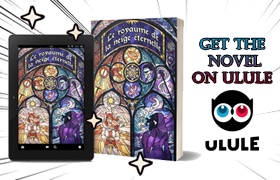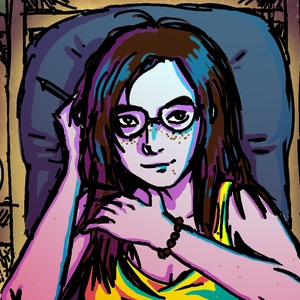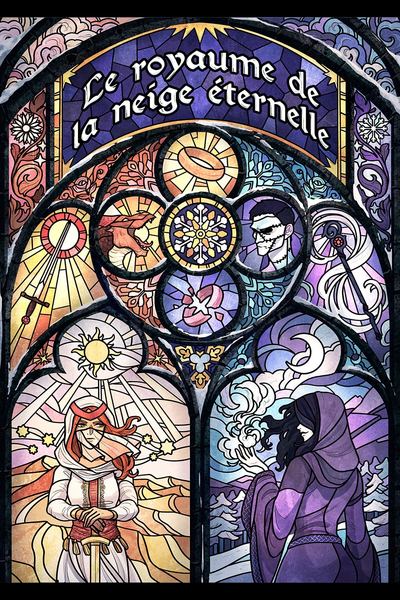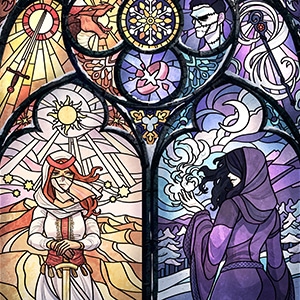II - Where you can hear the crash of broken dreams and the clank of dragged chains
Although the monarch claimed to be the representative of the gods in Dana, he was nonetheless fallible. He could not foresee that less than an eb'suu[1] after the festival, with only a month to go before the planned wedding between Thalia and Mark III, an unexpected event would put an end to his daughter's religious vocation and her promises of marriage.
It was now suppertime, but the princess had preferred to fast in order to support the affliction of the beggars; in no way did her action fill the bowls of these poor people or relieve their hunger, but Thalia was too preoccupied to think about it, especially since her gesture was greeted with admiration by her well-fed peers. When she was alone, the girl knelt beside the statue of Eva and caressed her prayer cushion without bowing to it. No doubt, if she had known what future awaited her, she would have chosen to ask the favour of Harha, the capricious goddess of fate. The forthcoming meeting with her betrothed, for a union she hardly wished for, made her stomach turn. Thalia had hoped that the High Priesthood would grant her eternal celibacy, but the gods had simply decided otherwise, she tried to comfort herself. She had to comply with their design, no matter what it cost her.
For marriage, whether in the Danean or the Corentian tradition – two deeply patriarchal nations known for their severity towards women[2] – was often far from being a loving delight for the bride. It was commonly synonymous with a life of servitude to her husband, the head of the family. Lucky if she consented to her role, the wife was considered by society only for her fertility and docility. Her elder brother had explained to her the day before how this advantageous alliance would benefit them from a military point of view. Alongside the Corentians, the war against the northern barbarians would be won in advance! The wizards and their armies would crumble like vermin under the feet of their war elephants! Her sisters, on the other hand, were simply ecstatic at the idea that their youngest sister would marry before them and boasted in advance about the magnificent little princes of whom they already imagined themselves to be aunts
For all its political advantages, the prospect of the wedding did not rejoice the main interested party. Sadness overcame her at the thought that soon she would be forced to organise a new Passing. The brief observance of her High Priesthood, probably the shortest in their history, would become a distant memory. Gathering her courage, Thalia gave herself a mental slap: it was her duty, that was all. For the well-being of her people, she was ready to endure any pain without the slightest resistance.
At least, she thought so.
The arrival of a soldier in uniform roused her from the dark labyrinth of her thoughts. Caught off guard, Thalia stood up quickly, smoothing the folds of her dress and checking the position of her headdress, confused. The temple was normally empty of worshippers at this hour. The man prostrated himself on the ground and kissed the floor at her feet, the highest mark of respect that could be given. Somewhat bewildered, the girl gave him permission to rise with a blessing and asked him to present his request, if he had one.
"We bring to you a comrade condemned to death. He has expressed the wish to be purified before his execution which will take place tomorrow at the first hour[3], as granted by his right."
Thalia shuddered at the unusual and terrifying sentence. Death penalties were not common in Dana; what could this criminal have done to deserve such punishment? Her mind returned anxiously to the subject of purification. It was essentially a confession and an advanced blessing. Having never performed this task with a dangerous individual, she would have gladly handed the case over another priest more experienced in the matter, but there was no one else in the room. Now that she was High Priestess of Dana, refusing such a request would tarnish the reputation of her temple and that of the royal family. However, the task normally required her to remain intimate with the prisoner, a man, for a long time, something she was normally forbidden to do once the engagement was announced. Which rule prevailed over the other? Was she a promised woman before she was a High Priestess, or the other way round? With a beating heart, Thalia made her choice: she allowed the convict to tread on the sacred slabs of the temple. The soldier bowed again before barking at his acolyte to let the criminal in.
His presence took the breath away from the young priestess for a moment. A charismatic and natural charm emanated from him, gaving him the figure of a leader of men. He was the archetype of a northern Danean or Bonsean warrior: a tall, sinewy body, like a jaguar, a hairless skin tanned by the sun and long, straight, black hair, which despite the detention was still tied in a high ponytail. His face features were fine, though swollen in places by recent bruises, adorned with almond-shaped obsidian eyes and a slightly long nose with a very straight, knife-like bridge. His body paint had been rubbed off, a classic humiliation for prisoners – otherwise, like most soldiers, his face or forearms would have been covered with warrior suqrenhdî. His aura was different from that of the other men; there was something indomitable, unrepentant. Yet there he was, chained, unpainted, bruised, and ragged. His thin, pale mouth expressed resignation. His gaze was respectfully fixed on the ground as he prostrated himself. Thalia stood for a moment petrified by this paradoxical spectacle. She unconsciously pronounced a blessing and dismissed the escort of soldiers. They withdrew to wait at the entrance of the temple after checking that their prisoner was well shod, reminding her to call for help if necessary. Purifications were normally individual and intimate rituals, but as this was a criminal sentenced to death, this right did not apply. Yet Thalia was careful not to inform them. She surprised herself: it was not her habit to be secretive in the exercise of her religious duties. And for what purpose? No doubt her concerns related to her forthcoming marriage prevented her from thinking clearly. Stepping forward like a sleepwalker, the girl led the prisoner to the back of carved wooden partitions.
The High Priestess handed the prisoner some incense ashes, which he was supposed to rub into his skin and hair[4]. He smeared it awkwardly with his large bound hands. She then made him drink holy water, a symbol of purity and devotion, noting how thirsty the condemned man was. With a brush made of sand buffalo’s hair, she drew a pattern of truth on his throat and the pattern of purity between his collarbones. She then sat down opposite him on a small stool. Nothing separated them, silence reigned in the temple and suddenly Thalia realised how dangerous what she was doing was.
After a moment of silence, she decided to speak:
"What are your names?"
She didn't have to know, but this man intrigued her for some reason. He looked neither like a traitor nor a murderer, and a heavy onyx quïra hung around his neck. The prisoner raised his gaze very calmly at her. Was this how all men braved death, or was he different from the others? Thalia found his attitude in the face of the inevitable both courageous and noble. A man of such greatness could only have been a valiant soldier before his downfall; she imagined him dreamily, in spite of herself, covered in a beautiful armour on a proud steed, his sabre brandished towards the sky shining with a thousand lights.
"My name is Lucas Amia Verdon," he replied. His baritone spread through the cabin like a warm wave. "I serve in the third fursilan of the K'lim[5]."
The fursilan was the denomination of a cavalry unit. The kingdom of Dana had more than a hundred thousand of cavalrymen, who were divided into fursil[6] numbered from one to one hundred. The first fifty fursil made up the light units, trained for archery, crossbow, blowpipe or even slingshot on horseback, the sabre being kept for close combat. The last fifty made up the armoured cavalry and the chariots. The third fursilan had been noted for its feats of arms in the vicinity of the Sea of Basalt against the first witch attacks, before the situation got out of hand.
Thalia thought of the prisoner's ego name: Lucas. The pronunciation was different from that of her little brother. Corroborating with his physiognomy, this kind of diction usually came from the lands further north, where the savannah and the desert began. He was seemigly a child of the sands, as they were called. With an encouraging gesture, Thalia impelled the cavalryman to begin his confession. Lucas cleared his throat slowly. His voice was low and firm, like that of a man who had been defeated, but remained faithful to his convictions. Sometimes his tone would rise and gain in heat, as if overwhelmed by a wave of emotion, and suddenly he would almost whisper, his gaze lost in the horizon of memories:
"During the clashes at Milan Bay, I was the second in command of our fursilan and had a special unit of ten men in my charge. It's not much, you might think, but there is not always strength in numbers when dealing with wizards. Our missions required us to be discreet, quick and efficient. As you know, many battles have been won by our fursilan, but our rout began internally, even before the armies of the North overwhelmed us. Hadam, a brother in arms and long-time friend, once collapsed lifeless next to me on patrol. His body showed no injuries. It occurred to me that he had been shot from a distance by a witch, but the existence of such a spell that could act without leaving a trace was unknown to us. I also thought of a barbaric disease, but there were no rumours of that. Searching through his belongings, I found his real killer: a blue residue known as 'dream powder'. It is a drug developed illegally from dream poppy seeds right here in Dana, and its success is matched only by the addiction of its users. It soothes pain in the body and mind, inhibits fear and is said to increase the senses of its users, the 'dreamers'. Unfortunately, when its effect ceases, the return to normality imposes a terrible melancholy or even dementia on the most vulnerable. Long-term use of the drug weakens the heart and veins, leading to sudden internal bleeding, which can even occur within the skull. Despite this, some 'dreamers' would go to any length to get even a small dose."
He paused. Thalia handed him another cup of water, which he accepted with thanks, but did not bring to his lips.
"Other members of our fursilan fell or went mad from the lack. When we returned to Dana, replaced by fresh troops, we did our best to forget the loss of our comrades and resume our lives. Everything changed for me when I went to meet Hadam's family in the poorest neighbourhoods of the city. I came across a terrible scene: a half-naked woman being beaten by five men. Her face was bloody and unrecognisable, she was curled up in a ball of living flesh and responded only feebly to the kicks that were thrown at her. I drew my sword and slit the throats of four of her tormentors. The fifth managed to dodge and then shouted at me: 'What are you doing, you fool? Do you know who we work for?' Those were his last words. It is true that I felt no pity or guilt while killing unarmed men, given that they were collectively attacking a defenceless woman. At this moment, I still feel none. The gods may judge my act as unworthy of a faithful, but I believe I will remain convinced, even in the torments of death, of the rightness of my act."
"And the woman?" asked Thalia, to whom the story gave cold sweats.
"She died of her injuries and no one claimed her body. I handed over her remains to the nearest common crematorium, where the ashes and bones are recovered for various uses."
The priestess nodded approvingly, while still shuddering at the fate of this poor soul. The story seemed more vivid and terrible than any war report she had ever heard. In spite of this, the girl tried to keep a composed expression. With a gesture, she invited the man to continue his confession.
[1] Sixteen-day period.
[2] Paradoxically, these two nations were the forerunners of many advances in gender equality until 150 pre-ES, following various political changes and reinterpretations of religious precepts.
[3] In much the same way as today, the days were divided into twenty-four hours: the morning stars' hour, followed by eleven hours of daylight, then the evening stars' hour, followed by eleven hours of moonlight. The stars' hour was the period when the Moon and the Sun are both going through the insides of the planet, allowing the sky to be dark enough for the stars to be visible to the naked eye.
[4] Incense was believed in many Southern cultures to have supernatural properties. It would facilitate communication with the gods. The resins chosen could sometimes contain hallucinogenic substances.
[5] (dan.) King.
[6] (dan.) Plural of fursilan












Comments (0)
See all